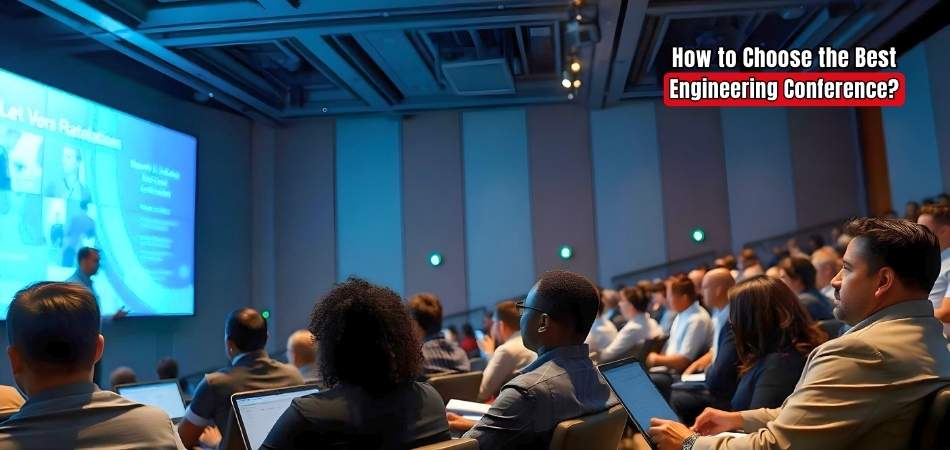Choosing the right engineering conference can be a crucial decision in advancing your knowledge and career. With so many events to choose from, each offering different focuses and networking opportunities, the process can feel overwhelming. From specialized topics to broader industry gatherings, make sure you align your choice with your professional goals. So, how to choose the best engineering conference?
To choose the best engineering conference, you need to identify your goals, research upcoming events, check their agendas and speakers, and consider the location and costs. Each conference varies in focus, so knowing what you hope to gain will guide you in making the best choice that aligns with your interests and career aspirations.
Are you curious about how to effectively select an engineering conference that suits your needs? Read on to explore detailed insights and practical tips that will help you handle this important decision-making process, ensuring you find the right fit for your professional journey.
Does Attending Best Engineering Conferences Matter?
Attending top engineering conferences is a valuable opportunity for professionals and students alike, as it offers exposure to the latest industry trends, networking with experts, and a chance to enhance one’s skills. These events often feature presentations on groundbreaking research and workshops that can broaden your technical knowledge, providing insights that are rarely available through traditional learning.
Beyond the educational benefits, conferences allow attendees to build strong professional connections. By engaging in discussions and exchanging ideas, participants can develop collaborations that propel their careers forward. Networking at such events is a significant advantage, as it brings together like-minded professionals from around the world.
For engineers, attending conferences in Canada can be impactful, as the country hosts some highly respected events. In fact, upcoming international engineering conferences in Canada offer amazing opportunities to connect with industry leaders and gain insights from global experts. Taking part in these conferences can be invaluable for anyone eager to advance in their engineering career
How to Choose the Best Engineering Conference?
Selecting the right engineering conference can significantly increase your professional experience. By following a structured approach, you can identify the event that best aligns with your goals and interests. Below are the steps that will help you make an informed choice when considering various engineering conferences.
Define Your Goals
Start by clarifying what you want to achieve by attending the conference. Are you looking to expand your network, gain insights into specific topics, or showcase your research? Knowing your objectives will help narrow down your options and guide your planning.
Research Upcoming Engineering Conferences
Conduct thorough research to find relevant engineering conferences in your field. Use online platforms, professional associations, and industry publications to compile a list of conferences that align with your interests. Take note of the dates, locations, and themes to help you make an informed choice.
Evaluate the Conference Agenda and Speakers
Once you have a list of potential conferences, review their agendas to see which sessions resonate with your interests. Look for keynote speakers, workshops, and panel discussions that align with your goals. Attending the most relevant sessions requires understanding the content before the event.
Check the Conference Reputation
Investigate the history and reputation of the conference you are considering. Look for reviews from past attendees to gauge the quality of content and networking opportunities. A well-regarded conference will typically offer valuable experiences and insights.
Consider Location and Accessibility
Think about the logistics of attending the conference. Is it accessible for you? Are the dates convenient? Make sure you can fit it into your schedule without causing significant disruptions to your work or personal life.
Evaluate the Costs
Conferences can vary significantly in cost. Consider registration fees, travel expenses, and accommodation costs when making your decision. Determine whether the investment aligns with the potential benefits you hope to gain from attending.
Connect with Previous Attendees
If possible, reach out to people who have attended the conference in the past. They can provide insights into their experiences and offer advice on what to expect. This firsthand information can help you make a more informed decision.
Make a Final Decision
After considering all these factors, make your final decision on which conference to attend. Ensure that it aligns with your professional goals and interests. Register early to secure your spot and take advantage of any early-bird discounts.
Research Guidelines for Upcoming Engineering Conferences
Finding the right engineering conference involves thorough research. Here are some effective steps to find and assess upcoming events that suit your interests and needs.
Utilize Online Resources
Start by searching for upcoming engineering conferences on reputable websites. Look for platforms that specialize in conference listings. You can easily find an international engineering conference to attend by exploring these dedicated resources. These websites often provide comprehensive details, including dates, locations, and topics covered.
Check Professional Associations
Many professional engineering associations host conferences throughout the year. Visit their websites for announcements and detailed information about upcoming events. This can be a great way to discover niche conferences relevant to your specific field. Joining these associations can also give you access to exclusive member benefits, including early registration and discounts.
Follow Industry News and Publications
Stay informed by reading industry journals and publications. They often highlight upcoming conferences and events. Subscribing to newsletters can also keep you updated on relevant opportunities. Industry publications may feature articles from past conferences, giving you insights into their value and relevance.
Make Use of Social Media
Follow engineering organizations and thought leaders on social media platforms. Many conferences are promoted through these channels. Engaging with posts can also provide insights into who will be attending and what to expect. You might find discussions or live updates that can improve your experience at the event.
Network with Colleagues and Peers
Reach out to colleagues who may have attended conferences in the past. They can offer recommendations based on their experiences. Personal referrals often lead to discovering high-quality events. Discussing your interests with peers can help narrow down which conferences would be the most beneficial for you.
How Can Engineering Conferences Help You?
Attending an engineering conference is an exciting opportunity that offers a variety of experiences. Let’s see some of the highlights of these conferences, from insightful presentations to valuable networking opportunities.
Keynote Presentations
Most conferences feature keynote presentations by prominent figures in the engineering field. These talks often provide valuable insights into current trends and future directions. Attending these sessions can inspire new ideas and approaches in your work.
Workshops and Breakout Sessions
Conferences usually include a variety of workshops and breakout sessions. These smaller, interactive settings allow for deeper discussions and hands-on learning. Participants can engage with experts and ask questions related to their specific interests.
Networking Opportunities
Expect ample opportunities to network with fellow attendees. Many conferences include designated networking sessions or social events. Use these moments to connect with other professionals, share experiences, and discuss the purpose of an engineering conference, as well as explore potential collaborations.
Exhibitor Showcase
Some conferences feature an exhibitor showcase, where organizations display their products and services. This can be an excellent chance to learn about new tools and technologies in your field. Engaging with vendors can also lead to potential partnerships.
Cultural Experiences
If the conference offers city tours or cultural experiences, take advantage of them. These activities can provide a break from the conference schedule while allowing you to explore the local area. It’s a great way to experience the culture and make lasting memories.
Awards and Recognition
Many conferences recognize outstanding papers and presentations. If you’re participating, be aware of any award ceremonies. These recognitions can increase your visibility and credibility in the field.
Tips for Making the Most of Your Conference Experience
Maximizing your conference experience involves preparation and proactive engagement. Here are some tips to help you get the most out of your time at engineering conferences.
- Set Clear Goals: Before attending, identify what you want to achieve. Whether it’s networking, learning about specific topics, or presenting your work, having clear goals will help you stay focused.
- Engage in Sessions: Attend as many sessions and workshops as possible. Participate actively by asking questions and engaging in discussions. This interaction can deepen your knowledge and provide valuable insights.
- Network Actively: Take the initiative to introduce yourself to other attendees. Building relationships is a key benefit of conferences. Exchange business cards and connect on social media to maintain these connections.
- Take Notes: Keep a notebook or digital device handy to jot down key points, ideas, and contacts. Reviewing your notes after the conference can help reinforce what you learned.
- Follow-up: After the conference, reach out to the people you met. Send a quick email or connect on LinkedIn to thank them for their insights. This follow-up can lead to ongoing professional relationships.
- Reflect on Your Experience: Take time to reflect on what you learned and how you can apply it to your work. Consider creating an action plan to implement new strategies or ideas.
By following these tips, you can improve your experience at engineering conferences and make meaningful connections that benefit your career.
Frequently Asked Questions (FAQs)
We’ve answered common questions about deciding which engineering conferences to attend. To help you make informed decisions, these FAQs are designed to clarify any doubts you may have.
How Do I Find Engineering Conferences Relevant to My Field?
You can find engineering conferences by checking industry-specific websites and professional associations. Many organizations maintain lists of upcoming events, including detailed information about topics covered. Additionally, searching online for “upcoming engineering conferences” can yield useful results.
What Should I Look For When Assessing a Conference?
When assessing a conference, consider the agenda, speakers, and topics that align with your interests. Look for networking opportunities and workshops that upgrade your professional skills. The overall reputation of the conference and attendee feedback can also help inform your decision.
Can I Present My Research at an Engineering Conference?
Many engineering conferences welcome research presentations from attendees. Check the conference website for submission guidelines, deadlines, and specific requirements. Presenting your research can increase your visibility and contribute to valuable discussions in your field.
Are Engineering Conferences Worth the Investment?
Yes, engineering conferences offer significant value through networking, learning, and professional development. Attendees gain insights into industry trends and build relationships that can lead to future opportunities. The knowledge and connections acquired often outweigh the investment made.
How Should I Prepare for an Engineering Conference?
Preparation is key to maximizing your conference experience. Research the agenda, plan your sessions, and set specific goals for what you want to achieve. Additionally, prepare any materials you need for presentations and ensure you have business cards for networking.
Final Words
Choosing the right engineering conference can significantly contribute to your professional development and networking opportunities. By carefully researching and considering your goals, you can select an event that aligns with your interests and career aspirations. Attending these conferences will help you stay updated on industry trends and make valuable connections with peers and leaders.
When you think about how to choose the best engineering conference, start by defining your objectives, researching the agenda and speakers, and looking at the event’s reputation. This systematic approach will help you identify which conferences offer the best opportunities for growth and learning in your field.








